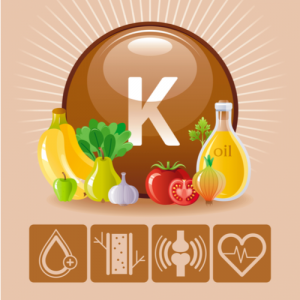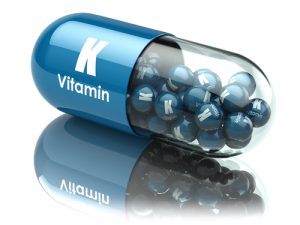Vitamin K is a set of fat-soluble vitamins your body requires to produce prothrombin. Prothrombin is a protein that plays a crucial role in supporting multiple body functions such as bone metabolism and blood clotting. It also helps regulate blood calcium levels in the body. This type of vitamin is stored in the liver and several other body tissues such as the heart, brain, bone and pancreas. Vitamin K-1 and vitamin K-2 are the two primary forms of that type of vitamin.
Vitamin K-1 (phylloquinone) is found in dark leafy vegetables. It’s the primary dietary source of the vitamin. Vitamin K-2 (menaquinone) is found in small amounts in fermented foods and organ meats. It’s also present in gut bacteria.
As people age, they might crave the vitamin for several reasons. So, what’s its role as we age?
Health Benefits of Vitamin K as You Age
Vitamin K provides multiple health benefits, from preventing heart disease to maintaining bone strength. It’s particularly crucial for wound healing due to its capacity to help the blood clot. Ensuring you’re getting enough of this vitamin in your diet will expose you to several benefits as you age:
1. Prevents Heart Disease
The amount of the vitamin in your dietary routine habit will determine your risk of possible heart disease in the future. Vitamin K may slow down the progression of chronic coronary artery calcification, which occurs when the buildup of calcium nutrients in the arteries hardens and restricts blood flow.
 2. Helps Heal Wounds
2. Helps Heal Wounds
Not every blood clot you experience in your body is terrible. For instance, when you get a bruise, scrape or cut, some types of proteins in your blood, especially those relying on vitamin K to work accordingly, can make your blood clot, or coagulate, to protect you from bleeding further.
The vitamin may help turn your liquid-looking blood into a sticky, gel-like consistency that hardens into a scab. If there was no blood clotting, you could bleed to death because of the significant or minor injury you sustained.
Patients with blood conditions such as hemophilia might have difficulties with blood clotting. They should maintain regular and adequate intakes of this vitamin, most preferably through their daily dietary routine.
3. Strengthens Bone Health
Like every tissue and organ in your body, bone cells constantly die off and become replaced. Vitamin K helps in the cell turnover process, encouraging the pattern of cell replacement and growth that helps maintain your bone strength. It also helps keep the bone resistant to breaking.
This vitamin may also improve bone density, decrease the risks of fractures and help your body maintain strong bones.
4. Heart Health
Vitamin K can help you maintain a lower blood pressure level by preventing the mineralization process. Mineralization is when there is a buildup of minerals in the arteries. By containing mineralization, your heart gets an opportunity to pump blood efficiently through the body.
 5. Anxiety and Depression
5. Anxiety and Depression
High blood glucose levels can increase your risk of developing anxiety, depression and cognitive impairment. Vitamin K can normalize your blood glucose levels to reduce symptoms of depression and anxiety.
6. Cancer
Vitamin K-2 contains some antioxidant properties that might assist in the protection against cancer. It can suppress genetic systems that progress to become tumor growth.
The Recommended Amount of Vitamin K in Your Body
It’s essential to get enough of the vitamin if you want to benefit the most from what it offers. According to AARP, approximately 60% of men and 40% of women aged 51 or above don’t receive the recommended quantity of vitamin K.
The recommended intake is 120 mcg and 90 mcg for men and women, respectively. A cup of dark green veggies daily can give you an equivalent amount or even more.
Certain medications may interfere with the levels of this vitamin in your body. For instance, prolonged courses of antibiotics may damage the gut bacteria responsible for producing the vitamin. Several cholesterol-lowering medications might interfere with your body’s capacity to absorb the vitamin properly.
If you’re currently using blood thinners like warfarin, you should not consume any vitamin supplements without seeking professional advice first. That’s because sudden fluctuations in vitamin levels can affect the anticoagulant impacts of warfarin and cause dangerous complications.

 2. Helps Heal Wounds
2. Helps Heal Wounds 5. Anxiety and Depression
5. Anxiety and Depression



